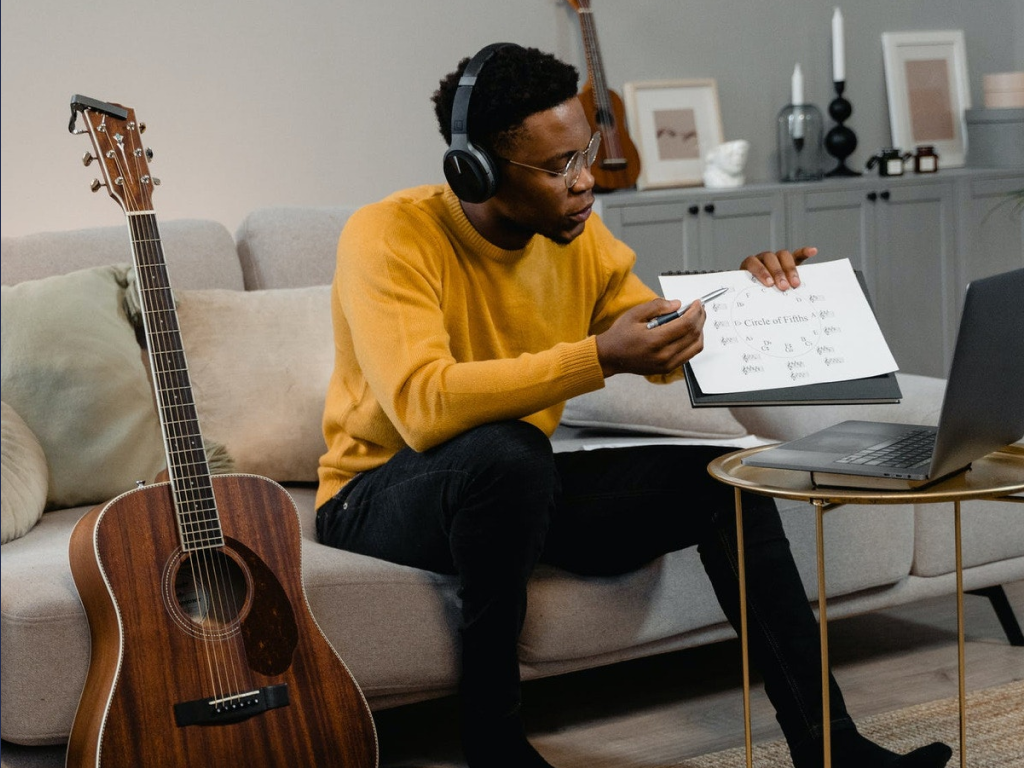Description
Grasp the essentials needed to begin playing acoustic or electric guitar. You'll learn an easy approach to get you playing quickly, through a combination of exploring the instrument, performance technique, and basic music theory.
For students who have long thought about picking up the acoustic or electric guitar, this course will provide an easy-access foundation that will get you playing. When first learning guitar, it is important to have the material presented in stages, in an enjoyable way that allows you to grasp the basics of the instrument and music. The course begins simply with the parts of the guitar, the names of the strings, tuning, and technique—whether finger-style or pick. It then explores the basics of music theory with such topics as scales, triads, power chords, and fingering and shapes.
At the end of this course, students will understand the structure, parts, and accessories of the instrument, in addition to an understanding of its basic maintenance. Electric guitar players will learn the operation of their instrument along with basic options for amplification, effect pedals, and sounds. Students will also learn to develop correct technique and apply theory concepts to their playing. They will have the foundational knowledge necessary to pursue most intermediate guitar courses.
Tags
Syllabus
- Welcome to Introduction to Guitar
- Welcome to Guitar for Beginners! Before you begin the course, we will cover all the details about the course and what you'll need to know to get the most out of your Berklee massive online course.
- Acoustic / Electric Guitar and the Basics
- In this first lesson, we will take things slow. We will focus on how to choose the right guitar for you and what accessories are essential for any guitar player. We'll also learn the parts of the guitar and get you comfortable with your instrument.
- Getting Started: Fundamental Guitar Skills
- In this lesson, you will learn how to tune and you will start playing your instrument from the ground up! Be patient and remember: focus on being accurate and play in consistent time with your metronome. These things are far more important than playing with speed.
- The Twelve Half Steps and Basic Notation
- While you don’t need to be an expert on music theory to play guitar, it is important to know the basic building blocks of music. With this understanding, music will no longer be shrouded in mystery or complexity. This lesson presents fundamental musical ideas in a fun, non-intimidating way.
- Scales: Construction and Fingerings
- In this lesson, you will dig into scales. Don’t be intimidated. Some of you may have heard of, or practiced, scales. It might have been during piano lessons. Most likely it wasn’t very exciting for you. Hopefully you'll find the approach to scales in lesson 4 much easier and even fun.
- Chords: Building Easy Triads and Power Chords
- In this lesson, you will use all of the skills you’ve gained from the previous lessons to build the foundation of harmony. You will play certain scale notes at the same time to create chords. Let's look at why chords sound like they do, how to build them, how to easily play chords in open position, and how to play chords that you can move all around the neck.
- Putting it All Together: The Pentatonic Scale and Songs
- Now that you have the "science" of the guitar in your fingers, you will learn a couple of songs. You will do this by using melody (from the scales) and harmony (from the chords) we have learned. You will also learn an essential scale for playing melodies and soloing.
Related Courses
Related Problem Sets

Guitar for Beginners
-
TypeOnline Course
-
Provider
-
PricingFree to Audit
-
CertificatePaid certificate
Grasp the essentials needed to begin playing acoustic or electric guitar. You'll learn an easy approach to get you playing quickly, through a combination of exploring the instrument, performance technique, and basic music theory.
For students who have long thought about picking up the acoustic or electric guitar, this course will provide an easy-access foundation that will get you playing. When first learning guitar, it is important to have the material presented in stages, in an enjoyable way that allows you to grasp the basics of the instrument and music. The course begins simply with the parts of the guitar, the names of the strings, tuning, and technique—whether finger-style or pick. It then explores the basics of music theory with such topics as scales, triads, power chords, and fingering and shapes.
At the end of this course, students will understand the structure, parts, and accessories of the instrument, in addition to an understanding of its basic maintenance. Electric guitar players will learn the operation of their instrument along with basic options for amplification, effect pedals, and sounds. Students will also learn to develop correct technique and apply theory concepts to their playing. They will have the foundational knowledge necessary to pursue most intermediate guitar courses.
- Welcome to Introduction to Guitar
- Welcome to Guitar for Beginners! Before you begin the course, we will cover all the details about the course and what you'll need to know to get the most out of your Berklee massive online course.
- Acoustic / Electric Guitar and the Basics
- In this first lesson, we will take things slow. We will focus on how to choose the right guitar for you and what accessories are essential for any guitar player. We'll also learn the parts of the guitar and get you comfortable with your instrument.
- Getting Started: Fundamental Guitar Skills
- In this lesson, you will learn how to tune and you will start playing your instrument from the ground up! Be patient and remember: focus on being accurate and play in consistent time with your metronome. These things are far more important than playing with speed.
- The Twelve Half Steps and Basic Notation
- While you don’t need to be an expert on music theory to play guitar, it is important to know the basic building blocks of music. With this understanding, music will no longer be shrouded in mystery or complexity. This lesson presents fundamental musical ideas in a fun, non-intimidating way.
- Scales: Construction and Fingerings
- In this lesson, you will dig into scales. Don’t be intimidated. Some of you may have heard of, or practiced, scales. It might have been during piano lessons. Most likely it wasn’t very exciting for you. Hopefully you'll find the approach to scales in lesson 4 much easier and even fun.
- Chords: Building Easy Triads and Power Chords
- In this lesson, you will use all of the skills you’ve gained from the previous lessons to build the foundation of harmony. You will play certain scale notes at the same time to create chords. Let's look at why chords sound like they do, how to build them, how to easily play chords in open position, and how to play chords that you can move all around the neck.
- Putting it All Together: The Pentatonic Scale and Songs
- Now that you have the "science" of the guitar in your fingers, you will learn a couple of songs. You will do this by using melody (from the scales) and harmony (from the chords) we have learned. You will also learn an essential scale for playing melodies and soloing.

 Online Course
Online Course 
 Free to Audit
Free to Audit  Paid certificate
Paid certificate 

